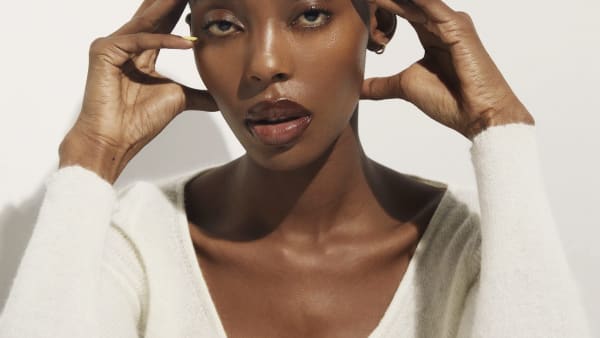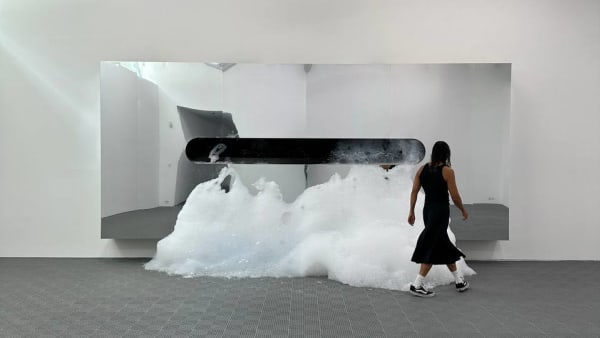
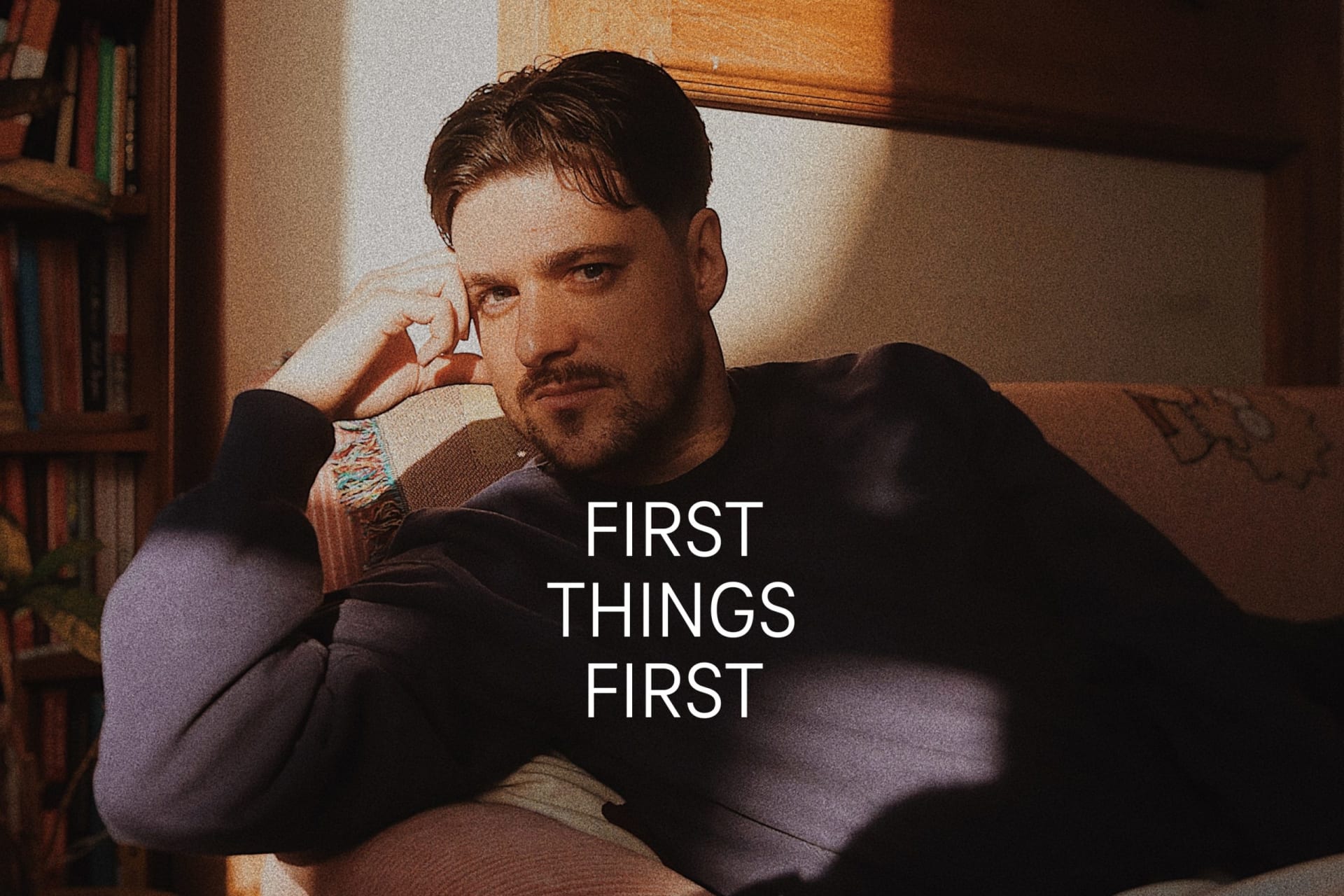
First Things First: Asquith
"Dance music for home, dance music for life" – an interview with the Lobster Theremin label boss, DJ, producer, and meme connoisseur.
London’s Asquith has worn pretty much every hat there is to wear in dance music. Perhaps most commonly known as the founder of seminal house music label Lobster Theremin, he originally cut his teeth in club culture as a promoter. The last few years saw his star rising with high-voltage DJ sets across the UK and Europe, his residency on Rinse FM and a string of stellar releases like 2019’s smash hit “Let Me (Rave Mix)“.
Having managed the bookings at London’s Corsica Studios for several years, he returned to promoting in 2021 with the inaugural LOBSTERFEST – a day festival held at the Cause with label alumni Tim Reaper, Route 8, Nthng, alongside friends like Mama Snake, Yazzus, and Heléna Star. He’s also a passionate meme creator, and recently launched his first merch line for dedicated fans of his Catsquith meme account. Wrapping up an eventful 2021, we caught up with him at his flat in London to get the lowdown on the multifaceted world of Asquith.
Do you remember the first CD you ever bought?
That was ‘Torn’ by Natalie Imbruglia. There’s going to be no cool answers to these questions. I didn’t grow up entirely with dance music unless you want to count commercial trance and club classics. I have a real soft spot for super melodic pop music, especially ballads. Um, anyone who’s familiar with Magic FM in the UK probably will know what I mean. I just love the melodies. I remember studying pop music theory in school and just learning about how those things were constructed was just so amazing.
Was there a record that you bought early on that had a big impact on your career?
It was “Same Old Place” by Genius of Time, and around that time I met Nick Williams, who works at Phonica. We have been friends for years now, but he was just like, ‘Oh, if you like that, you’ll love this.’ And that record had a huge impact on me. And interestingly, just after I moved to London, about 11 or 12 years ago I was very close to moving to Berlin, and I went to have an interview with the label Suol. I was working at Harrods at the time on the shop floor there for Barbour, and basically, the interview was on a Wednesday, and afterwards, Genius of Time were playing at Watergate and I went and then at 6 am I flew back. So I stayed up all night and flew back to London, went straight from the airport to Knightsbridge, had a shave and a Starbucks, got into my suit and then was out on the shop floor, for like, 9 am. And I remember my colleague came out and was like, ‘Oh my god, I’m so hungover, I went out last night.’ And he looked at me and said, ‘Oh yeah, you look fine,’ and I was like, ‘I’ve literally not slept, and I’ve just come back from Berlin.’ So there’s a little anecdote to go with that!
I've literally not slept, and I've just come back from Berlin.
This element will show content from various video platforms.
If you load this Content, you accept cookies from external Media.
Tell me about the first release on Lobster Theremin, because it’s a great story.
So, that was Palms Trax, that was Jay. Me and Jay have known each other for a very long time predating Lobster Theremin. We were friends for a few years before that. I was a promoter at the time and I used to do club nights around London and I booked him to play at my night. A while later, we went on a night out, and came home and continued drinking and listening to music.
And he played this track, and I was just like, ‘Oh my god, this is just stunning. What is this?’ And he was like, ‘Oh, it’s me.’ And it was ‘Equation’ that he played, and I was just like floored. I’d been thinking of starting Lobster Theremin for a while, and we said ‘Cool, let’s do it.’ And I think it’s really beautiful that that first record launched both Lobster Theremin and Palms Trax – it’s such a lovely thing to look back on.
The vinyl sales were good, I remember pressing 500 and a friend of mine said ‘You sure? You sure you want to do that?’ And it was like ‘Yeah, we’ll sell 500!’ Maybe even a bit overconfident. But it did, and it was great, and it seemed to make some nice waves, but then it took a little bit of time to kind of filter through. And we obviously had a lot of people going ‘Lobster Theremin, what? What’s that?’ You know, you show them the logo, and you’re like ‘What?’ You know, it’s interesting. But that was the whole aim was to be inviting and intriguing and not be too exclusionary. You can look at the logo and laugh, the name is a bit daft, so you already feel quite nice and are on board. So that’s how it was always meant to be. But that first record is stunning.
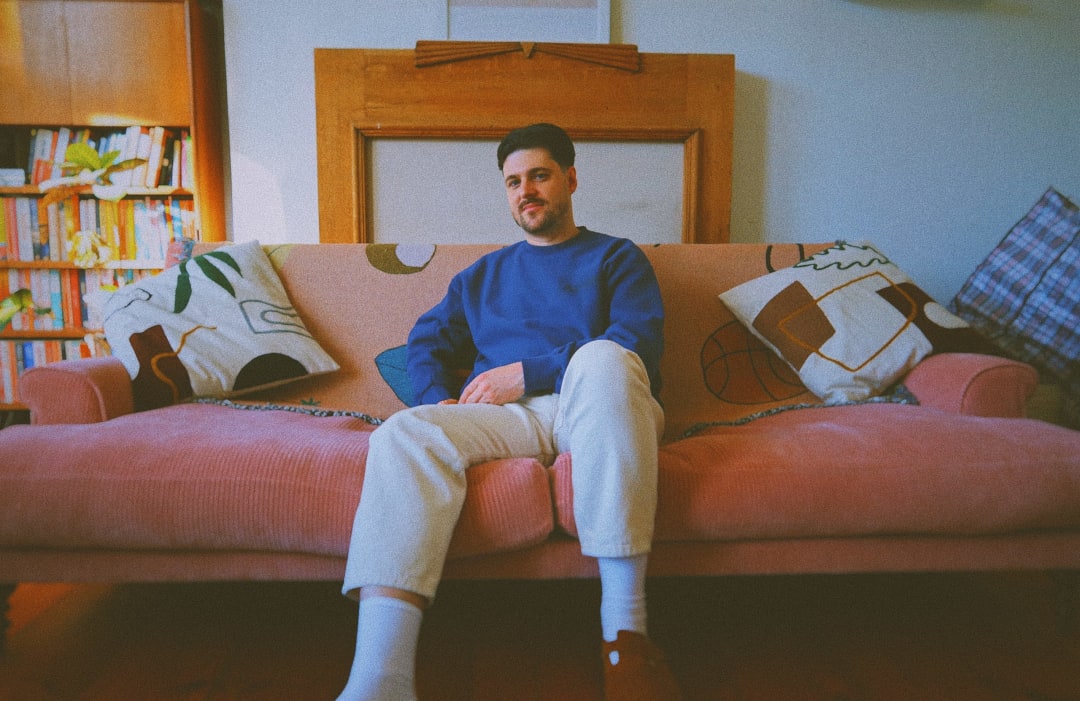
Is there a release that you can remember that inspired you to write your own music?
I’ve produced in different periods of time under different aliases but as Asquith (and I think it’s probably fairly obvious from the production) I would say the record that most inspired me was “Rave” by Head High. You know, the work he’s done with his various aliases is just astounding. And I have been through a few kinds of periods of production and I really enjoyed attempting to craft those kinds of kicks and that kind of nostalgia and then adding that into a lot of other influences I have as well. That’s what I love. And I almost was like, OK, there’s enough music that utilizes some of those techniques and some of those sounds. So I’m going to take some of that influence, take all this other influence, and I’m going to put my own twist on things and actually just kind of experiment across genres. And yeah, I’d say that’s probably the record that really, really changed my life. Like, in a big way.
Any other influences you can recall?
Too many to mention really, Omar-S, of course. I really love the real Detroit rawness and experimentation, especially in Detroit house. And the stuff that came about at that time was really pushing boundaries sonically. And there’s a Big Strick record, ‘Maybe 1 Day’ with Tony Coats on vocals. It’s just amazing. It’s so beautiful. And then there’s a track before it called ‘State of Emergency’, which is just so trashy and punky–it sounds like it was recorded in a bathroom or something. But there’s loads of soul in there as well, and you can feel what’s going on in those records. And it’s elements like that, and it’s artists like that I was really drawn to in my production because I’m self-taught. I learned to produce music on the internet and there are so many forums like with people saying how you should do something, how not to do something, you know. But the reason that no one could necessarily aspire to get close to what [Omar-S and Big Strick] were doing is because they just weren’t following these rules. They were doing something else. There’s so much value in experimenting and just trying things and being like, ‘how would you achieve something taking into account all the–quote-unquote–wrong ways to do something?’
Without having been confirmed for release 'Let Me (Rave Mix)' was just getting hammered by big festivals, big artists and I kept getting tagged in Identification of Music groups.
This element will show content from various video platforms.
If you load this Content, you accept cookies from external Media.
What does your process of making music look like?
I’ve written most of my music while travelling on an aeroplane or on a train. My studio has been a laptop and a pair of headphones, for the most part. I also have a refurbished desktop computer that I occasionally use with a pair of Yamaha HS 8 speakers. They’re massive. I remember getting them and thinking, ‘Oh my God, what have I done?’ But they’re really nice. So I produced a chunk of material on that. Actually, the other Christmas I produced, I think I’ve bounced 12 or 14 tracks, and I thought, ‘Wicked, I’m done for the year,’ got them all signed and signed some myself and thought, ‘Cool, that’s all done now.’
I like just kind of doing things in bursts and when inspiration comes in, to be honest, when, when I’m DJing as well. I didn’t find [lockdown] to be the most inspiring period of time, and now I’m back gigging again and god, I’m so excited, I have all these ideas. I usually try to bounce one track per gig, so I can play something new out and see how it sounds, how it fits into the set.
Do you remember when you first heard one of your tracks in a club?
I think the biggest one for me was just before ‘Let Me (Rave Mix)’ came out. I made loads of music at the time, and I sent the music out to quite a lot of DJs. Then I just noticed that even without having been confirmed for release ‘Let Me (Rave Mix)’ was just getting hammered by big festivals, big artists, and it was already like, ‘Oh, wow, that’s not really happened before.’ And then suddenly I was getting tagged in all these videos and Identification of music group and stuff like that. And I was like, ‘I mean, this doesn’t even have a release date, I need to sort it out.’
This element will show content from various video platforms.
If you load this Content, you accept cookies from external Media.
How has your style evolved over the years?
I’m really enjoying experimenting with faster speeds. I also like playing around with ways to speed up something like 4/4 techno. I don’t know how to put it any other way, really, but it’s almost like a BPM mirage because what you’re doing is you’re trying to find something that works at a certain tempo that can be applicable to a wider audience. Now that might sound a bit strange given that some of these tempos are 172 BPM. I do this thing where I’ll kind of write the melody, and then I’ll close my eyes, and I’ll change the tempo until I think it’s bang on. I’m releasing some faster stuff and there’s a lot of that to come on [my label] Higher Power, which is nice.
What’s the first thing you look for when you receive a demo?
I’ve just got to feel it as a fan, as a listener. I don’t pick over, you know, how you’ve EQ’d the snare or all those things. It’s the songwriting, like, is this a good song? Do I want to listen to this? Because if you start getting too pedantic and make it a bit too highbrow, I think that’s when you start to really lose the connection with what music actually means to people. And I’ve always tried to keep it like that. You know, I think there are a lot of people out there who are way more technically able than I am, who could probably pick up all the records and tell me which ones are more technically well produced than others. But I think that only comes in as a value to a certain extent. I think over and above all of that is the idea that, you know, are these are pieces of music standalone that I would want people to be able to listen to in moments in their life that are not necessarily just confined to being in a club space? Lobster Theremin’s philosophy is ‘Dance music for at home dance music for life’. I want it to mean more to people and that’s how I want to curate music and that’s what I want to try and put together. And I think interestingly, you know, when the pandemic started, there were labels who were immediately worried because clubs are shut down.
Lobster Theremin's motto is: Dance music for at home, dance music for life.
I think we’ve always seen ourselves as a label that releases music that you can listen to outside of the club anyway. And also, I think that because we worked in so many different sides, you know, the majority of your market is DJs who play at home. I think it’s really important to not lose sight of that and not just see club music as this single pipeline. I believe in that wider idea and obviously seeing the journey of a track or a release to essentially its final destination, which is to be played on a sound system for people coming together in a nice space is a magic unto itself. But there is a separate, very personal and individual kind of connection and magic to music in the sense that I’m describing. And it has to be applicable for those two things, I think.
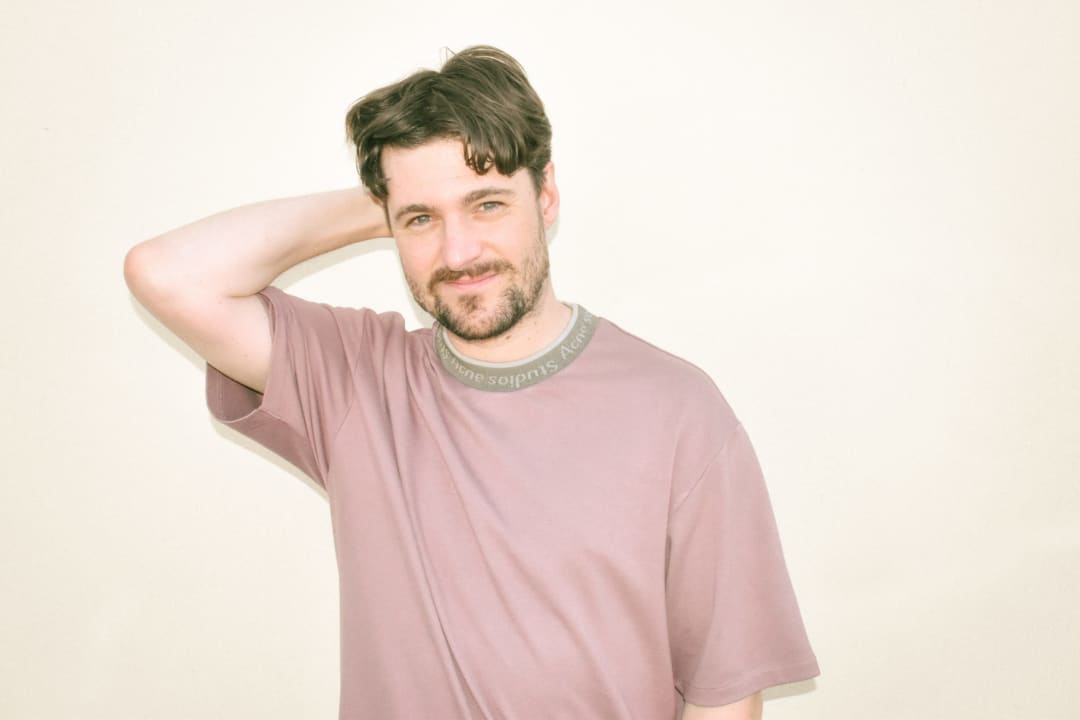
This year you put on your first big daytime rave with the label, LOBSTERFEST. How did that come together?
I was a promoter before I did anything else. I’ve been promoting a night called Find Me In The Dark, and I only recently stopped working as an in-house booker at Corsica Studios, so I was running and my colleague at Lobster was running a night called NAFF. Both were really great, but eventually, I stopped doing events because it was too much to think about and it felt like a good time to change.
And then when the lineups started getting announced again this year, we felt like it was kind of the same old names. There were some really backwards line-ups in terms of diversity, and seeing that as the first event to be announced was really frustrating.
I think that frustration was shared by quite a few people. So LOBSTERFEST was always there in the back of my mind, it was always something that I wanted to do. I love doing new things as well, that’s been giving me a lot of energy recently. At that time I just thought, ‘Actually, we can do something new, we can utilise all these skills we’ve got in-house. We can do bigger projects than we’ve done it before. And we can provide a more positive template for other promoters, labels, and people in the music industry and use this opportunity as well to showcase a lot of talent that we believe in.’
And hopefully, that can also then become a really good incubator for those artists to do even more. Even though a lot of those artists smashing it, it’s really about getting behind people, making noise and saying, ‘this is who we believe in and we want to help push people forward.’
This element will show content from various video platforms.
If you load this Content, you accept cookies from external Media.
I also think through the nights that Rosy and I did like Find Me In The Dark, we often broke artists in London and at that [Corsica Studios] capacity level, and we would often see people go on to play for promoters who are maybe a notch above us. So we wanted to use the event as a vehicle for positive change and to use our strength as a brand that has an international presence.
Because obviously, we’ve got the label, we’ve got the distribution, and we’ve got a record shop. And then on top of that, we have the podcast series, which has been opened up to way more DJs who don’t necessarily release music. And then with LOBSTERFEST we could expand that even further.
It was such an amazing day, the crowd was lovely, everyone smashed it. I do have to give a shout-out to Rosy because two weeks out I remember I was on my bed in the foetal position, feeling overwhelmed. And I’ve just never seen anything well-organised in the end. It was great, and I think we achieved a lot of positive objectives with that, and hopefully we’ll get to keep doing it.
We can provide a more positive template for other promoters, labels, and people in the music industry and use this opportunity to showcase a lot of talent that we believe in.
Before I let you go, I also wanted to talk about Catsquith, the DJ meme page you run – which recently hit 40k followers. What motivated you in starting the account?
I know it’s going to probably sound a bit mad but I believe in memes so much as a mode of information transfer and a method of education that we really can’t ignore. I think it’s a really unique form of high art that we’re not necessarily appreciating in this time.
So the name Catsquith came up, probably around 2015, when a friend called me that. Lobster Theremin’s Instagram handle was originally Catsquith, but I changed it once I stopped taking Instagram for granted and actually saw it as a genuine platform for promotion. And that’s when I decided to revive it on a new account, because I always liked having that outlet.
By this point, Catsquith’s follower number has overtaken the Asquith page, and it’s probably going to take over all our white label pages in a couple of months. And yeah, it’s just crazy how much those things grow, but it’s also just really fun.
Caroline Whiteley is a freelance writer whose work explores the intersections of club culture with politics, visual arts, design and technology for publications like Crack Magazine, Resident Advisor, and Telekom Electronic Beats, where she worked as an editor until 2021.
Published December 22, 2021. Words by Caroline Whiteley, photos by Dekmantel & HÖR.


